Tankless water heaters are on demand hot water heaters designed to only heat water when you need it, thus saving you energy and money.
They are energy efficient, portable, in most cases, and they heat water pretty fast.
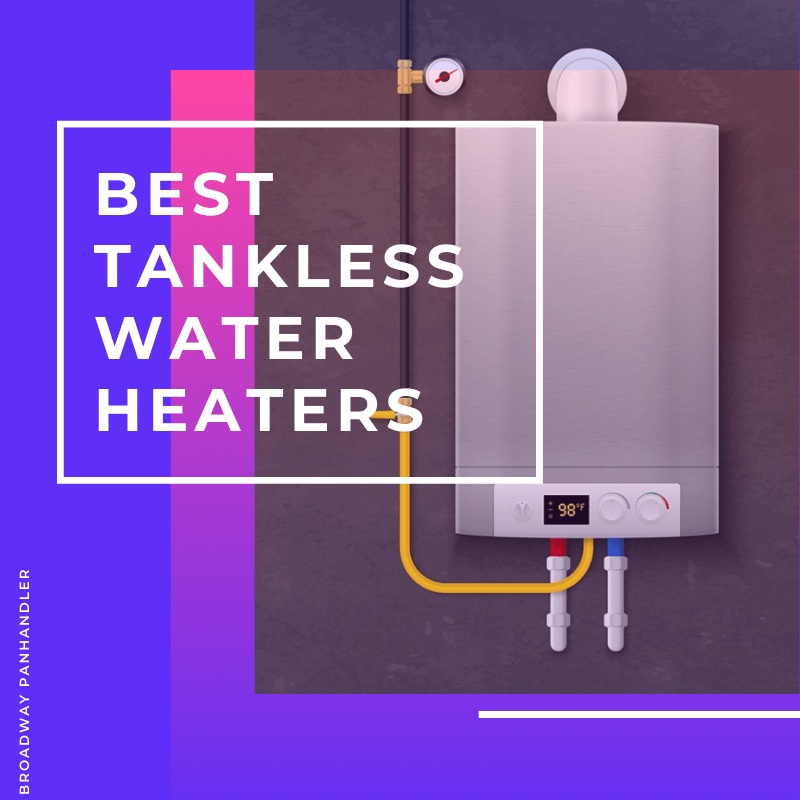
Chances are that you are looking for the best electric tankless water heater for your home OR in need of a good tankless gas water heater for outdoor and in cases where there is electricity shortage, but do not know which hot water heater to go for.
In this tankless water heater reviews and buying guide, you will know which tankless water heater is best after rigorous testing, and learn how to choose the best tankless water heaters for your home.
Top 5 Tankless Water Heaters 2022
Show Summary
These are the top rated best tankless water heaters you can buy in 2022:
- Best overall: Ecosmart Eco 27 Electric Tankless Water Heater.
- Best electric tankless water heater: Stiebel Eltron Tempra 24 Plus Electric Tankless Water Heater.
- Best tankless gas water heater: Rinnai RU199iN Natural Gas Condensing Tankless Hot Water Heater.
- Best for indoors: Takagi T-KJr2-IN-NG Indoor Tankless Water Heater.
- Budget friendly option: Bosch Tronic 3000 T 4-Gallon Electric Mini-Tank Water Heater.
Best smart electric tankless
Ecosmart Eco 27 Electric Tankless Water Heater

Ecosmart Eco 27 Electric Tankless Water Heater is best for 2-bathroom homes and more.
If you are in the market for a tankless water heater for small sized home with 2 – 3 bathrooms, Ecosmart Eco 27 is the best water heater there is. Ecosmart ECO 27 offers an energy-efficient water heater with accurate temperature control and flow rates monitoring to give you consistent hot water when you need it.
| Type | Electric |
| Best for | Small to medium sized homes |
| Dimensions LxWxH | 3.63 x 17 x 17 inches |
| Where to buy | Amazon US, UK | Walmart |
Best tankless gas water heater for large homes
Rinnai RU199iN Natural Gas Condensing Tankless Hot Water Heater
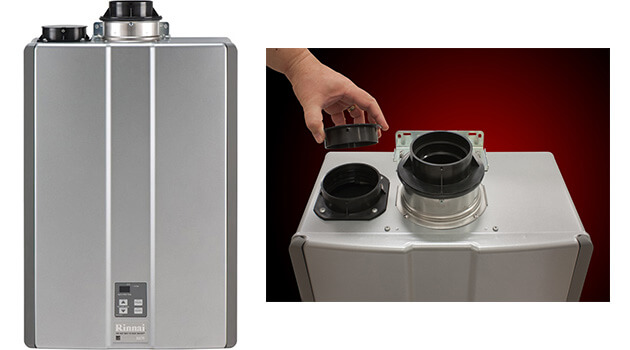
Rinnai RU199iN Natural Gas Condensing Tankless Hot Water Heater is best for large homes.
The Rinnai RU199iN Natural Gas Tankless Hot Water Heater is a powerful indoor water heater with optimal water pressure that can deliver up to 11 GPM hot water flow rate for a powerful and constant hot water flow throughout the house.
| Type | Natural Gas |
| Best for | Large homes |
| GPM’s – Gallons Per Minute flow rate | 7-11 GPM |
| Where to buy | Lowe’s | Amazon US, UK | SupplyHouse |
Whole house electric tankless water heater
Stiebel Eltron Tempra 24 Plus Tankless Water Heater
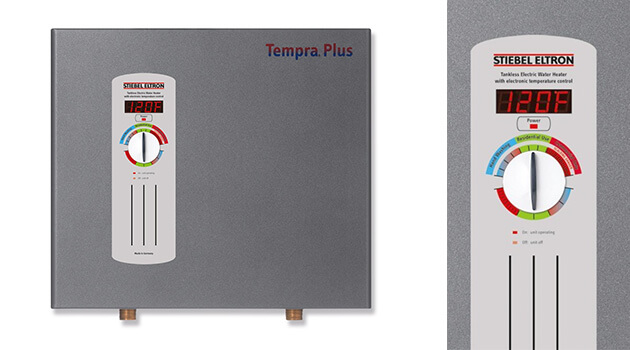
Stiebel Eltron Tempra 24 Plus is the best whole house electric tankless water heater.
Stiebel Eltron Tempra 24 plus is a highly rated electric on demand hot water heater with advanced water flow control system that is able to provide an endless hot water supply to the whole house. This particular tankless water heater from Stiebel gives a great mix of power, speed and performance.
| Type | Electric, Battery powered |
| Best for | Whole house electric tankless |
| Dimensions LxWxH | 4.63 x 16.63 x 14.5 inches |
| Where to buy | Amazon US, UK, CA | Home Depot |
Affordable and budget friendly option
Bosch Tronic 3000 T 4-Gallon Electric Mini-Tank Water Heater
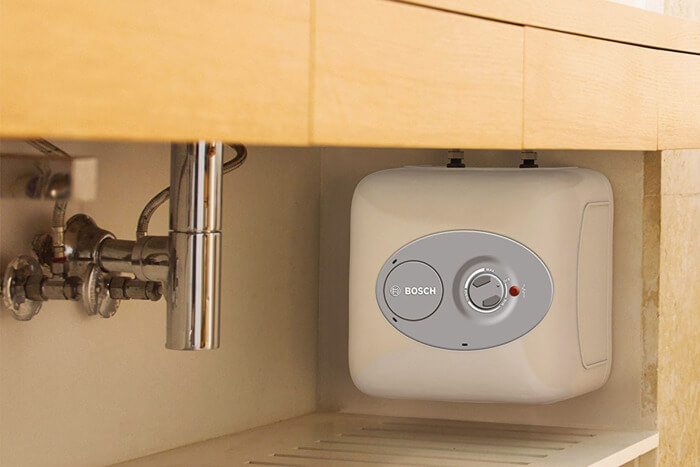
Bosch Tronic 3000 T 4-Gallon Electric Mini-Tank Water Heater is the cheapest water heater on the market.
The Bosch Tronic 3000 T point-of-use electric mini-tanks water heater is a compact sized instant water heater available in three different sizes. It can either be wall-hung or floor-mounted, and fits easily under a sink or even in a cabinet space.
| Type | Electric, Point of use |
| Best for | Point of use |
| Dimensions LxWxH | 13.75 x 13.5 x 13.75 inches |
| Where to buy | Amazon US, UK, CA | Home Depot |
An old-fashioned storage tank water heater is the third largest consumer of energy in the average home, constantly guzzling fuel just to keep unused water at temperature. Tankless water heaters are a cost- and energy-efficient alternative, heating water only as needed. And while the upfront costs are relatively higher, the life expectancies of tankless units are up to twice as long as that of tank-types (20 years vs. 10).
The 5 Best Tankless Water Heaters
We compared different electric and gas whole-home tankless water heater models from popular brands such as Bosch, Ecosmart, Stiebel, Rinnai and more. After series of tankless water heater reviews, we have shortlisted the best tankless water heaters for homeowners seeking for on demand heated water below.
Here then is a reviewed list of the best tankless water heaters:
1. Our #1 Pick: Ecosmart Eco 27 Electric Tankless Water Heater
Our top pick of the best smart tankless electric water heater
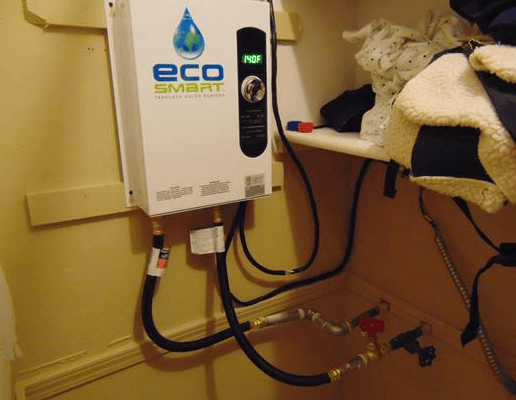
The EcoSmart ECO 27 is an energy efficient tankless water heater that works well in small, medium and average homes that don’t have huge demands for hot water constantly running.
Heater Type: Electric tankless | Dimensions: 17H x 17W x 3.625D inches | Weight: 13.75 lbs.
The Design.
Featuring a digital display that lets you set the exact water temperature between 80- and 140-degrees Fahrenheit, the Eco 25 and 27 is a compact electric water heater that can fit perfectly well even in homes with small or little storage space.
For the main build, Ecosmart used Copper and Stainless-steel components, which have the ability to withstand high temperatures, while transmitting the heat from one end to the other, thus makes this unit a durable on demand hot water heater.
Performance and Features.
Using the ECO 27 self-modulating technology, it makes sure the heater draws energy only when it needs it. This technology leads to an increased energy savings of up to 50% and a high heater efficiency. Yes, this heater heats water very well and fast.
Flow Rate.
The Eco-25 smart water heater is able to give you up to 3 gallons of hot water per minute in areas with temperatures as low as 37 degrees Fahrenheit, and up-to 6 gallons per minute, in areas where the temperature of the incoming water is high.
What this means is that, it can power up to four showers and a sink at the same time without running out of hot water.
Pros and Cons
Things we like
- Digital display and temperature control allows easy control and monitoring of the temperature required.
- Copper and Stainless-Steel components make it very durable.
- Patented self-modulating unit provides best in class industry leading energy efficiency (about 1-3% higher than other leading models), which saves you more over time.
Things we dislike
- For areas with mineral-rich water, extra care is required for the copper elements care.
- When household demands exceed the unit’s capacity, you may get cold water instead. In which case, an installation of a valve to throttle the flow rate is recommended to get thing back up balanced.
Overall,
The EcoSmart ECO 27 is a compact and highly efficient tankless water heater electric model with enough capacity to heat water on demand for two showers running simultaneously. No doubt, the ECO 27 is one of the best smart water heaters on the market, an excellent choice for home owners who wants to save money and reduce their environmental footprint.
2. Best whole house electric tankless water heater: Stiebel Eltron Tempra 24 Plus Tankless Water Heater

Packing an incredible flow rate of up-to 4.68 gallons per minute (GPM), Stiebel Eltron Tempra 24 Plus is an on demand tankless hot water heater that rivals many gas-powered heaters of the same size.
Type: Electric water heater | Dimensions: 4.6W x 16.6H x 14.5D inches | weight: 1 pounds | Minimum flow to activate unit: 0.50 GPM
For those who probably haven’t heard the name before, Stiebel Eltron is a German electronics manufacturer considered to be one of the world’s leading specialists when it comes to manufacturing water source heat pumps.
The Design.
The design of this tankless hot water heater is somewhat unique in the sense that, it makes by far, less noise than other units listed here. This is done with the high-grade electronic parts and a reliable cover, which do not vibrate and, there is no mechanical switches.
Features and performance.
Talk of the word efficiency in a water heater and I will show you the Steibel electric water heater tankless.
What really separates this tankless water heater from a majority of other instant hot water heater is its built in “Tempra Advanced Flow Control”, which by the way unique to Stiebel Eltron tankless water heater technology.
What this does is, while some tankless water heater models may produce cold water if the flow rate exceeds the heating ability, the Tempra 24 Plus automatically reduces the flow rate to keep the water temperature steady, so you get no cold surprises.
Flow Rate.
With a flow rate of up to 4.68 gallons per minute, this electric tankless hot water heater rivals many gas-powered on demand hot water heaters. and all thanks to its advanced flow control technology, no matter how much you experiment with the flow rate, the water temperature will always stay constant.
Pros and Cons
What we like
- Energy efficient: self-modulating technology modifies the heater to keep its energy intake constant.
- An advanced control over the flow and temperature of the water gives you enough flexibility to either reduce the flow to save more energy or tune the temperature to your exact liking.
- Sleek design, can fit properly in homes with little to no space and quiet during operation.
What we did not like
- The only con I could pick out is that, Stiebel warns that you hire its licensed personnel to install the product if you wish to keep your 3-years warranty valid.
Overall,
With Over 90 years of experience gone into this product by a renowned tankless water heater brand, the Steibel eltron plus is no doubt one of the best tankless water heater available. It’s also equipped with a large display that shows you the temperatures in an easy-to-read digital format, and a highly responsive dial selector that allows you to set the temperatures to suit you.
3. Best tankless gas water heater for large homes: Rinnai RU199iN Natural Gas Condensing Tankless Hot Water Heater
The Rinnai RU199iN Natural Gas Condensing Tankless Hot Water Heater is an Energy Star Certified indoor water heater that can deliver up to 11 GPM of hot water to your home. It has lots of venting system installed to keep the environment safe.

Type: Natural gas and propane | Dimensions LxWxH: 22.05 x 14.76 x 33.86 inches | Weight: 82 pounds | Flow Rate: 11 GPM | Voltage: 120 volts
Who is this hot water heater good for?
If you live in a large house or have a big family that needs hot water running on demand to multiple faucets and showers simultaneously without fail.
The Design.
Firstly, this is a natural gas-powered tankless water heater, and unlike other electric models out there, the design is unique and solid, with two ventilation systems mounted at the top which makes sure no form of gas is released within the house or place of installation.
The Features and Performance.
For the performance of this propane heater, the Rinnai gas tankless water heater gives out one of the best flow rates we have ever seen in a tankless water heater.
One of the biggest problems usually associated with Natural gas water heaters is the problem of venting. To ensure proper ventilation, Rinnai has equipped the RU199iN with two venting options: first which is the concentric-PVC and the other – twin-pipe. You can choose between any of them that you find easy to install.
Flow Rate.
The ability of the Rinnai RU199iN to heat water is amazing. This heater can provide hot water at a flow rate of between 7.5 GPM up to 11GPM. Which is large enough to completely power two to three bathrooms and even serve for commercial purposes. Although the flow rate does stems from the natural gas intake which varies from 15,200 to 199,000BTU.
Efficiency.
During the cause of our tankless water heaters review, we found this propane on-demand hot water heater with a 0.95 efficiency rating. Something very few propane heaters can achieve. So, yes, it’s safe to use.
Pros and Cons
Pros
Although this water heater is bulky (which is only normal to keep more gas and clean air ventilation), it does also occupy less space, with its unique space saving design.
It comes with smart chips to prevent short-circuiting so as to keep you and your family safe.
Advanced temperature lock system ensures that, once you’ve set the temperature, it remains the same without and change whatsoever.
Cons
Its bulky.
When household demands exceed the unit’s capacity, you may get cold water instead. In which case, an installation of a valve to throttle the flow rate is recommended to get thing back up balanced.
Overall,
With an energy efficient level that can be compared to none, and a great heated water flow, the Rinnai RUC98iN is the best gas tankless heater on the market right now for large homes. You will find it very useful if you live in a large house or have a big family who wants heated water on demand without fail.
4. Best affordable water heater: Bosch Tronic 3000 T 7-Gallon Electric Mini-Tank Water Heater
A portable instant water heater on a budget

The Bosch Tronic 3000 is a budget tankless water heater to go for, if you don’t have the money to splurge on the more expensive models, but still crave for something of great quality.
Type: Portable electric point of use | Dimensions: 10 x 10 x 16 inches | weight: 36 pounds | Size: 4 gallons
The Design.
The Bosch Tronic 3000 T is the smallest on demand hot water heater on this list. Its compact design makes it really unique, outside the fact that it can blend seamlessly with your interior decor, it so compact that it can fit under a sink, in a cabinet, or even on the wall with the included wall bracket.
Features and Performance.
Firstly, the Bosch 300T can be mounted virtually anywhere, indoors and outdoors. One striking thing about this unit is that, unlike other models that require venting, this portable tankless heater is a point of use on demand water heater, just plug it in and its working.
The Bosch Tronic 300 T may be small but its heating ability is commendable. It heats water at a temperature range of 65 to 145 degrees Fahrenheit which is enough for most needs in a typical household.
Pros and Cons
Pros.
- Compact design makes it a great option for heating water in mobile homes, boats, and outside kitchens.
- Point of use flexibility makes it a great option for your garage, basement, patio, kitchen or other rooms in the house.
- Easy to set up.
Cons.
- Its small and compact, which limits its usage to smaller hot water needs. (I don’t think this is a con though, that’s what it was manufactured for).
Consumer review: What real users are saying
It’s so nice having instant hot water! This unit is very easy to install with minimal tools and know-how. It takes less than 20 minutes to install once you get the stuff from the hardware store. You will need to have an electrical outlet under the sink though, so check that before you buy this unit. I used a little cheap screwdriver, small pliers, and a cheap adjustable end wrench. You can do this! You will love the instant hot water
James Smith
Home renovator5. Best Indoor: Takagi T-KJr2-IN-NG Indoor Tankless Water Heater
A top-rated natural gas indoor tankless water heater

The Takagi T-KJr2-IN-LP is a mid-priced propane tankless water heater with good flow rates, sleek design and energy efficiency.
Type: Propane hot water heater | Flow rate: 6.6 GPM max flow rate | Weight: 38 pounds | Dimensions: 6.7 x 13.8 x 20.3 inches | Energy star certification: Yes
Takagi are known to produce high GPM machines and this unit is no short of quality. Even in cold climates, the Takagi K4 is still able to supply up-to eight (8) gallons of heated water per minute, which should be enough for two showers and a sink to run at the same time.
The Design.
This unit features a sleek and compact design. To be precise, this is actually one of the smallest tankless water heaters in the Takagi line-up. The weight is 38pounds and measures at 20.3″ * 13.8″ * 6.7″, which is significantly small enough to place just about anywhere that is practically possible.
Features and performance.
When it comes down to heating water, the Takagi Tkjr2 does a really good job, to constantly provide heated water on demand.
First is an anti-freeze technology, which helps to keep its outdoor units running smoothly through all seasons, and a Hi-Limit Switch that Consistent water temperature is maintained through thermistors and an air-fuel-ratio (AFR) sensor that monitors efficiency and reduces emissions. All these put together not only helps this unit run smoothly, but also prevents unexpected bursts of cold water.
Flow Rate.
Takagi are known to produce high GPM machines, take for instance, their T-M50 model produces up to 14.5 GPM. The maximum flow rate of the Tagaki T-KJr2-IN-LP we saw was up to 6.60 GPM, which should be enough for small to medium sized houses with 1, 2 or 3 bathrooms.
Pros and Cons
Pros
Inbuilt evolutionary sensor and thermistors monitors efficiency while minimizing emissions.
Higher energy factors up to 0.83 as compared to tank gas heaters which generates 0.7. This thus helps you save more money while making sure you get constant on demand hot water in your taps and shower.
Cons
A general disadvantage of gas heater though, the cost of installation is a bit higher compared to the electric models because of the ventilation system that first has to be put in place.
Consumer Reviews: What real life users are saying
Went from a tank water heater to this and I love it. Was hesitant about switching to tankless, but it has been amazing, and our monthly electric was drastically reduced, and the increase in natural gas was minimal. I also love the fact that I can take a really long, hot shower and never worry about running out of hot water. Definitely recommend for anyone.
John Williams
Home ownerAlthough switching from a tank water heater to a tankless on demand unit can sometimes be expensive, obviously because it requires you to use the services of a plumber to retrofit your plumbing and possibly your electrical system. But if you’re building a new home, adding to an existing hot water heater, or just tired of the high energy bills generated by your tan heater, installing a tankless water heater may make economic sense.
A Beginners Guide to Tankless Water Heaters
Tankless Water Heater Installation: Who should do it?
Although it can be tempting to DIY and install your new tankless water yourself sometimes, most homeowners do not have the required skills and experience, it is recommended that a professional installs your water heaters correctly and safely while taking less time overall.
While a professional has all the required skills and knowledge to install your tankless water heater, they also offer professional advice on water heater suggestions for your home. To show how crucial this is, some tankless water heater brands only sell through certified installers.
How to Find a Professional Tankless water heater installer
To find the best plumber in your area, take some time to look at their online customer reviews on Yelp, Angie’s List, HomeAdvisor or other consumer reviews websites. If they don’t clearly outline their pricing and estimated completion time and provide a written quote, don’t use them, even if they are the lowest bid.
Factors to consider before buying a tankless water heater
Before you go all over searching for a tankless on-demand hot water heater to buy, it is important to put the following factors into considerations, to avoid compatibility and other issues faced by many home owners.
Electric Vs. Gas Water Heaters
Tankless water heaters usually use one of three power sources namely: electricity, natural gas or propane. In most cases, the type of tankless hot water heater you buy is decided by the power source you have in your home. It’s good you know what your options are, and if you have more than one power source, then you decide on which to use.
Electric tankless water heaters usually have lower operating costs but can be more expensive to buy. On the other hand, natural gas and propane models cost less to buy and have slightly higher operating costs. Additionally, gas models do not require electricity and can work when your power goes out.
Energy Efficiency
Generally, tankless water heaters use less energy to operate than conventional water heaters, though some models are more efficient than others, to maximize the energy efficiency of an on demand hot water heater, go for one that is Energy Star qualified.
However, keep in mind that the most efficient water heaters, like the Rinnai RUC98iN, usually have the highest prices. The Rinnai is not only efficient, but it runs off- using both natural gas and propane, and has multiple venting options. Sure, do worth the price if you ask me.
Heater Size and Flow Rate
The bigger the size, the bigger the flowrate and the more water is heated faster, to serve multiple bathrooms and faucets, producing hot water constantly.
The size of a tankless water heater generally impacts and influences the rate and quality of heated water produced. If what you need is hot water for your entire home, then you are better off with a mid-sized or larger unit with a high GPM (gallons per minute) to keep up with the demands of people using multiple faucets.
Very compact and smaller models with a flow rate of around 0.5GPM, may only work for a single bathroom or faucet. The good thing about them though is that, they can be used to add hot water to a garage sink outside your home.
How to Determine Which Tankless Water Heater is Best for You
As mighty as these mini machines are, manufacturers invariably exaggerate their capabilities. They crow that you will “never run out of hot water,” but the truth is you can run out if you overtax the unit’s flow rate — measured in gallons-per-minute (GPM). Purchasing a unit with the right GPM for your household is key.
So, how much hot water do you need? A tankless unit has to quickly heat incoming cold water and supply it to your pipes every time you turn on a faucet or start a load of laundry. The more powerful the water heater is, the quicker it can heat and supply. But a big house in Minneapolis is going to need a lot more power than a condo in San Diego. Using the tools below, we’ll help you choose the unit that’s best for your home.
First, figure out your temperature rise.
Start by finding your groundwater temperature. Water temperature varies by region and season. The colder the water coming into your home is, the more your unit will have to work to bring it up to temperature, so it is best to size your unit based on winter conditions.
To find the exact water temperature of your area, check with your local utility company.
Then subtract your ground water temperature from 120°. This is your temperature rise.
Tankless units’ sense incoming water temperature, heating it up to match your water heater’s thermostat setting. The standard is 120° F, unless you’re running a sanitizing cycle in your washing machine. The greater the difference between groundwater temperature and 120° F, the greater the demand placed on your unit.
Next, add up how much hot water your household uses.
Sites like Compact Appliance say to add up the GPM of only the fixtures you plan on using during a time of peak demand — like when your entire family is getting ready in the morning. Buying a tankless unit with a capacity lower than that means you’ll quickly exceed its limits and feel the icy effects.
However, the Bosch representative we spoke to insists you should add up the GPM of every fixture in your house. This way, it’s impossible to run out of hot water. But how often do you run every single fixture at the same time? We recommend a moderate approach:
Add the GPMs of the fixtures you simultaneously use, then round up generously. This is your flow rate.
Now, put those two numbers together. Your water heater should deliver the flow rate you need at your local temperature rise.
In all the customer reviews we read, the number one complaint was clear: The purchased unit was not as powerful as manufacturers led them to believe. Many manufacturers list the max flow rate — how many gallons of hot water the unit would produce if it was, for example, working with the lukewarm groundwater of the Gulf states. This optimistic GPM will not apply to the vast majority of homeowners.
Robert Dishman, General Manager of Alliance Plumbing in Portland, Oregon, reports that homeowners need to do their research and choose a unit that is “sized and designed correctly for their household hot water demand. Then they’ll be a happy customer.” While it may be tempting to go with a cheaper, lower-GPM model, we garnered from reviews and expert input that these will likely fail to supply the hot water your household needs.
Instead, it’s critical to look at the manufacturer specs for the models you’re considering — typically on the company website or farther down the page on sites like The Home Depot. It may take a few extra clicks, but finding a unit’s flow rate for a range of temperatures will give you a much more accurate expectation.
Check your fuel type.
Tankless water heaters are available in natural gas, propane, and electric models, but the best choice for you is likely whatever fuel type you’re currently set up for. However, if you are remodeling or building from the ground-up, weighing the benefits and drawbacks of each fuel source is worth your time.
Electric units are cheaper to install and maintain, but their flow rate maxes out at 5.5 GPM. Natural gas and propane units are more common — and more powerful. Some models can pump out water at up to 10 GPM.
Methodology: How we ranked and choose the best electric and gas tankless water heater
To determine the best tankless water heater ranking, the Panhandler Home Improvement editorial team analyzed third-party data on 12 major companies and customer reviews on 5 popular online marketplaces, with each product’s star rating determined by evaluating a variety of metrics, including:
Price (35%)
Customer rating (35%)
Max GPM (10%)
Heating Capacity (BTUs) (10%)
ETL Certified (5%)
Energy Star Certified (5%)
Which Tankless Water Heater Brand Should You Choose?
We liked the Takagi K4 series for most households running gas. Its mid-range power is enough to supply hot water to several fixtures simultaneously and offers an array of safety features that reduce the risks associated with gas units.
Don’t have a gas hookup? Stiebel Eltron is your best bet for electric. The company specializes in electric models, and has led the industry forward with innovations that save energy and increase power. Their top models can supply ample hot water for a couple of simultaneous showers and a sink.
If you’re looking for the most powerful option out there, check out the Professional Prestige series from Rheem. Representing the next level in gas water heating, these high-efficiency natural gas or propane units can keep up with a washing machine, dishwasher, and shower running simultaneously. Throw in the kitchen sink on full blast, too.
Conclusion
All thanks to the federal regulations that now requires water heaters to be more energy-efficient. Tankless water heaters are better than they used to be. While new storage tank water heaters are required to operate more efficiently, tankless on-demand hot water heaters are even more efficient than that.
Resource Links
- Whole home tankless water heater buying guide – Energystar.gov
- Purchasing energy-efficient residential electric storage water heaters – Retrieved 2019 from energy.gov